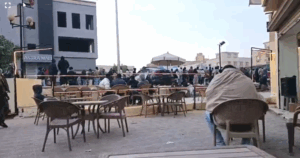Sudan peace talks reconvene in Juba
Peace negotiations between the Sudan government and the armed movements resumed in South Sudan capital of Juba today.
 South Sudan President Salva Kiir meets the head of the Sudan government delegation, Deputy Chairman of the Sovereign Council, Mohamed Hamdan ‘Hemeti’ in Juba today (SUNA)
South Sudan President Salva Kiir meets the head of the Sudan government delegation, Deputy Chairman of the Sovereign Council, Mohamed Hamdan ‘Hemeti’ in Juba today (SUNA)
Peace negotiations between the Sudan government and the armed movements resumed in South Sudan capital of Juba today.
Minni Minawi, head of the Sudan Liberation Movement (SLM-MM), was first to address the opening session of the third round. He said that the December revolution came as a result of the accumulation of “a struggle”, explaining that the opportunity is available to build a real Sudan by the criteria of the long struggle to realise change.
The session was further addressed by Malik Agar, head of the Sudan People’s Liberation Movement-North faction in Blue Nile state (SPLM-N Agar), where he announced that they would work hard to achieve the peace that needs partnership and cooperation between the parties.
He explained that the agreement on humanitarian issues was not implemented as required, stressing the right of the war-affected regions to self-rule in Sudan Common Framework.
Agar explained that the security arrangements should include building a unified strong army by integrating the Sudan Armed Forces, Rapid Support Forces militia, and the forces of the armed movements within the comprehensive peace process.
Partnership
Dr El Hadi Idris, Chairman of the Sudan Revolutionary Front, emphasised that the Front has a real desire to reach peace, and that the spirit of partnership between all political parties is a required issue for the success of the peace project in Sudan, especially the Forces for Freedom and Change to announce the leadership of this transitional stage.
Abdelaziz El Hilu, head of the SPLM-N faction in South Kordofan, stressed the commitment of his movement to the path of peace talks. “We are in front of the responsibility to reach a sustainable peace to end the suffering of the Sudanese people,” he said, stressing that they are fully confident in reaching the results of achieving a sustainable peace that addresses the roots of the crisis.
The head of the government delegation, the Deputy Chairman of the Sovereign Council, Mohamed Hamdan ‘Hemeti’, greeted in his speech the delegations of the armed movements, stressing that they are fully confident in reaching the results of achieving a sustainable peace that addresses the roots of the crisis.
The last one to address the opening session was Tut Galuak, Security Advisor to South Sudanese President Salva Kiir and head of the mediation team, who confirmed that peace is at the door, indicating that negotiations will sfollow six axes, namely, eastern Sudan, Darfur, the Nuba Mountains, Blue Nile, northern Sudan, and the centre.
The spokesperson for the negotiating delegation of the Sudanese government, Hasan El Taayshi, confirmed to reporters before the delegation left Khartoum International Airport to Juba, that the new government has the real will to remove all problems that caused the war in Sudan, and said that the Sudanese have an ideal opportunity to reach a comprehensive and sustainable peace agreement that ends the war and establishes a new country.
Apart from Hemeti, the government delegation includes the head of the Supreme Peace Commission, Suliman El Dabalo, Minister of Cabinet Affairs Omar Manis, who is in charge of the humanitarian file, Minister of Defence Jamaleldin Omar responsible for the file of security arrangements, Minister of Finance Ibrahim El Badawi in charge of the file for allocating resources and wealth, Minister of Justice Nasreldin Abdelbari, Minister of Federal Governance Yousef El Dei, representatives of the Forces for Freedom and Change (FFC) coalition, and community leaders representing Sudanese refugees and displaced people, and other stakeholders.
Representation
The Justice and Equality Movement (JEM) led by Jibril Ibrahim rejected the participation of the FFC in the negotiations, considering that it acquired the full privilege to form the transitional government, and therefore it is represented by the government, and it has no room to be an additional party at the negotiating table.
The movement called in a statement to the need for commitment by the parties to the Juba Declaration by letter and by spirit, to build trust and prepare the ground for serious negotiations.
According to JEM, the Juba Declaration confirms that no party outside the parties to the declaration can be a partner in the negotiations except with the consent of these parties, and that negotiation only between the parties to the declaration is the transitional authorities and the Sudan Revolutionary Front, and that political organisations are not allowed to be a party to the negotiation.
The movement made it clear that representatives of the displaced, refugees, and civil society organisations in the peace negotiations must be agreed upon so that their participation and how to choose their representatives are not a reason to obstruct the negotiations.
JEM demanded that the African Union and the international community play an active role in the negotiations as facilitators, observers, guarantors and contributors to the implementation of the peace agreement reached, and the statement indicated that only a decorative presence of these parties does not make sense.
Radio Dabanga’s editorial independence means that we can continue to provide factual updates about political developments to Sudanese and international actors, educate people about how to avoid outbreaks of infectious diseases, and provide a window to the world for those in all corners of Sudan. Support Radio Dabanga for as little as €2.50, the equivalent of a cup of coffee.












 and then
and then